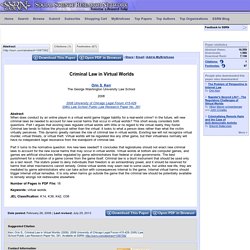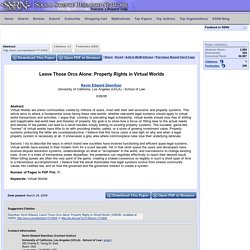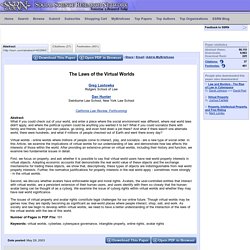

Bragg v. Linden: Virtual Property Rights Litigation by Candidus Dougherty. Criminal Law in Virtual Worlds by Orin S. Kerr. The George Washington University Law School2008 2008 University of Chicago Legal Forum 415-429 GWU Law School Public Law Research Paper No. 391 Abstract: When does conduct by an online player in a virtual world game trigger liability for a real-world crime?

In the future, will new criminal laws be needed to account for new social harms that occur in virtual worlds? This short essay considers both questions. Part II turns to the normative question: Are new laws needed? On a Legal Framework in a Virtual World: Lessons from the VirtualLife Project » VoxPopuLII. EULAs and Online Gaming – Simply a Better Fit Than Property Law? Recently, whilst doing some research on the concept of ownership and licensing in the video game industry, I came across a very interesting paper by Christopher J Cifrino entitled “Virtual Property, Virtual Rights: Why Contract Law, Not Property Law, Must Be the Governing Paradigm in the Law of Virtual Worlds“.[1] In this paper, Cifrino argues (unsurprisingly if you read the title) that contract law might actually be the best and fairest way to continue dealing with the legal relationship between the gamer/consumer and the developer and/or publisher.

(For ease of writing, the term “developer” will be used here to represent the party dictating the license terms, acknowledging that, at times, that can in fact be the publisher or even a third party distribution platform). Many commentators, however, criticize EULAs as being too one-sided and argue for courts to acknowledge traditional common law property rights in virtual property. [C]ontract law should remain the dominant paradigm.
Virtual Property, Virtual Rights: Why Contract Law, Not Property Law, Must Be the Governing Paradigm in the Law of Virtual Worlds - Boston College Law Review. The great debate: Law in the virtual world. Viewcontent. Leave Those Orcs Alone: Property Rights in Virtual Worlds by Kevin Edward Deenihan. Virtual Worlds are online communities visited by millions of users, most with their own economic and property systems.

This article aims to attack a fundamental issue facing these new worlds: whether real-world legal systems should apply to virtual world transactions and activities. I argue that, contrary to prevailing legal scholarship, virtual worlds should stay free of stifling and inapplicable real-world laws and theories of property. My goal is to show how a focus on fitting laws to the actual needs and desires of the parties can lead to a result besides simply bolting on existing property systems. The sociable, game-like "homes" of virtual worlds have little to do with providing shelter, safety, or a store of growing investment value. Property systems protecting the latter are counterproductive. Second, I try to describe the ways in which brand new societies have evolved functioning and efficient quasi-legal systems.
"Virtual Worlds as Comparative Law" by James Grimmelmann. James Grimmelmann Article comments Available under a Creative Commons Attribution 3.0 license.

Abstract What would happen if we took seriously the claims of virtual worlds to be genuinely new places? Societies have laws, so why should virtual societies be any different? In some cases, these legal systems track our own surprisingly well. Part II of this Article will discuss virtual property, which has been one of the most spectacularly successful features of massively multiplayer games. Part III will discuss the forms of investment and exchange governed by contract law in the real world.
Part IV explores the social dynamics of groups of players, specifically, how they prevent undesired conduct by others and how they band together for common purposes. Finally, Part V turns to one of the most discussed problems in game design: How do we reassure players that designers’ overwhelming powers over game spaces will not be used maliciously? Suggested Citation. The Laws of the Virtual Worlds by Greg Lastowka, Dan Hunter. What if you could check out of your world, and enter a place where the social environment was different, where real world laws didn't apply, and where the political system could be anything you wanted it to be?

What if you could socialize there with family and friends, build your own palace, go skiing, and even hold down a job there? And what if there wasn't one alternate world, there were hundreds, and what if millions of people checked out of Earth and went there every day?